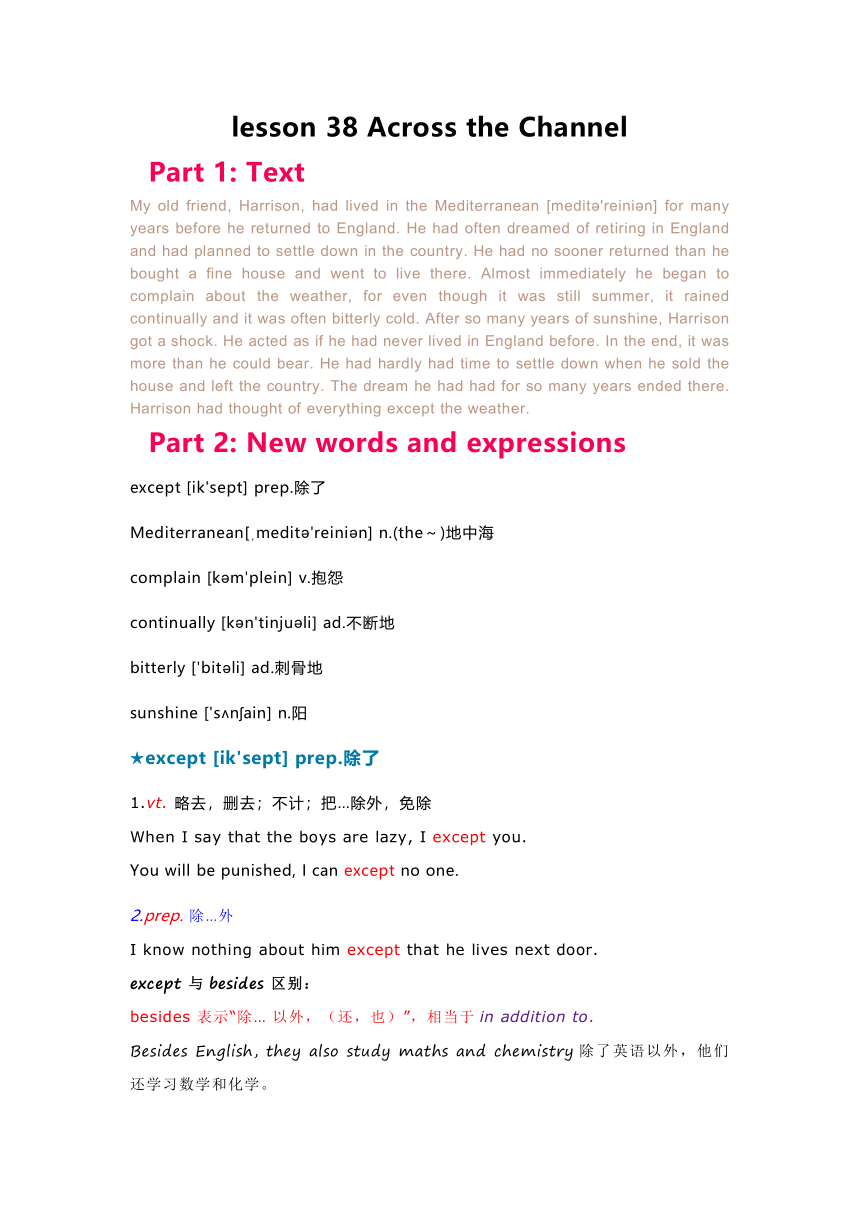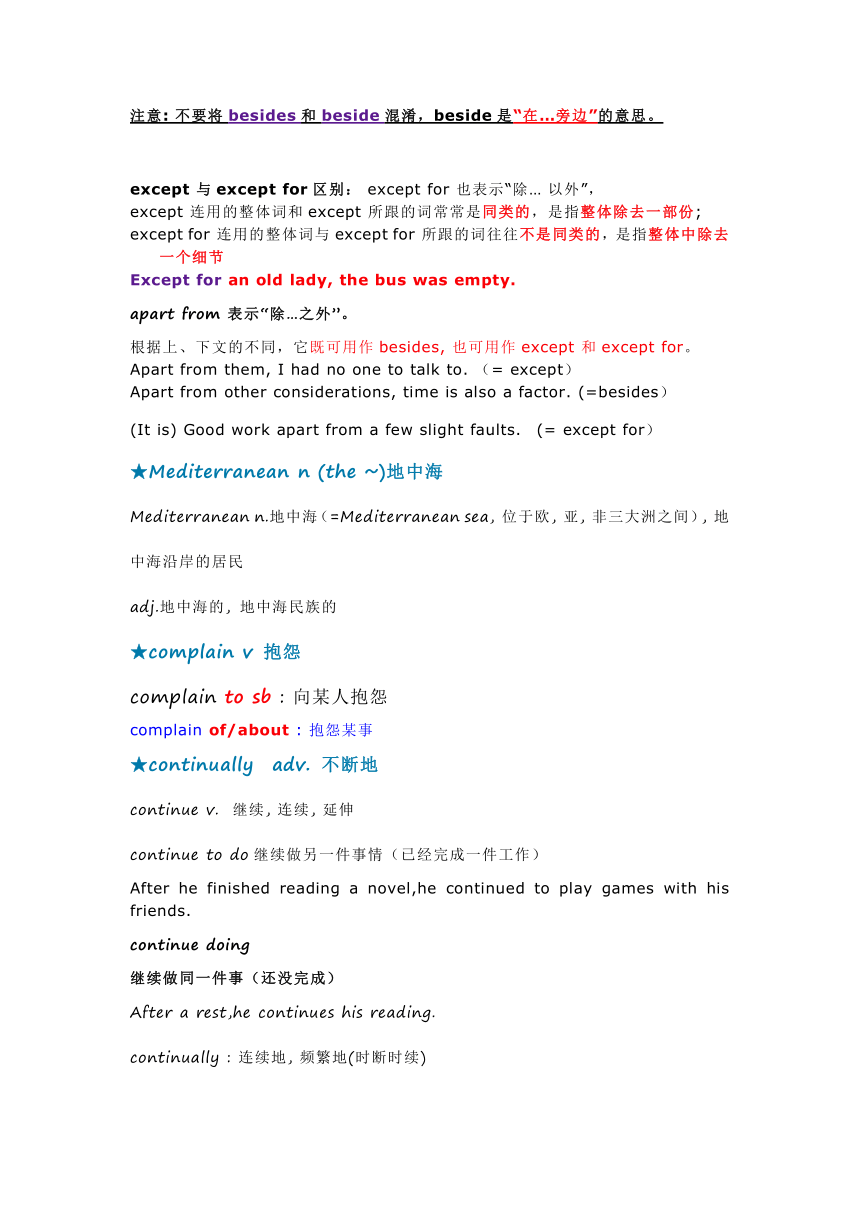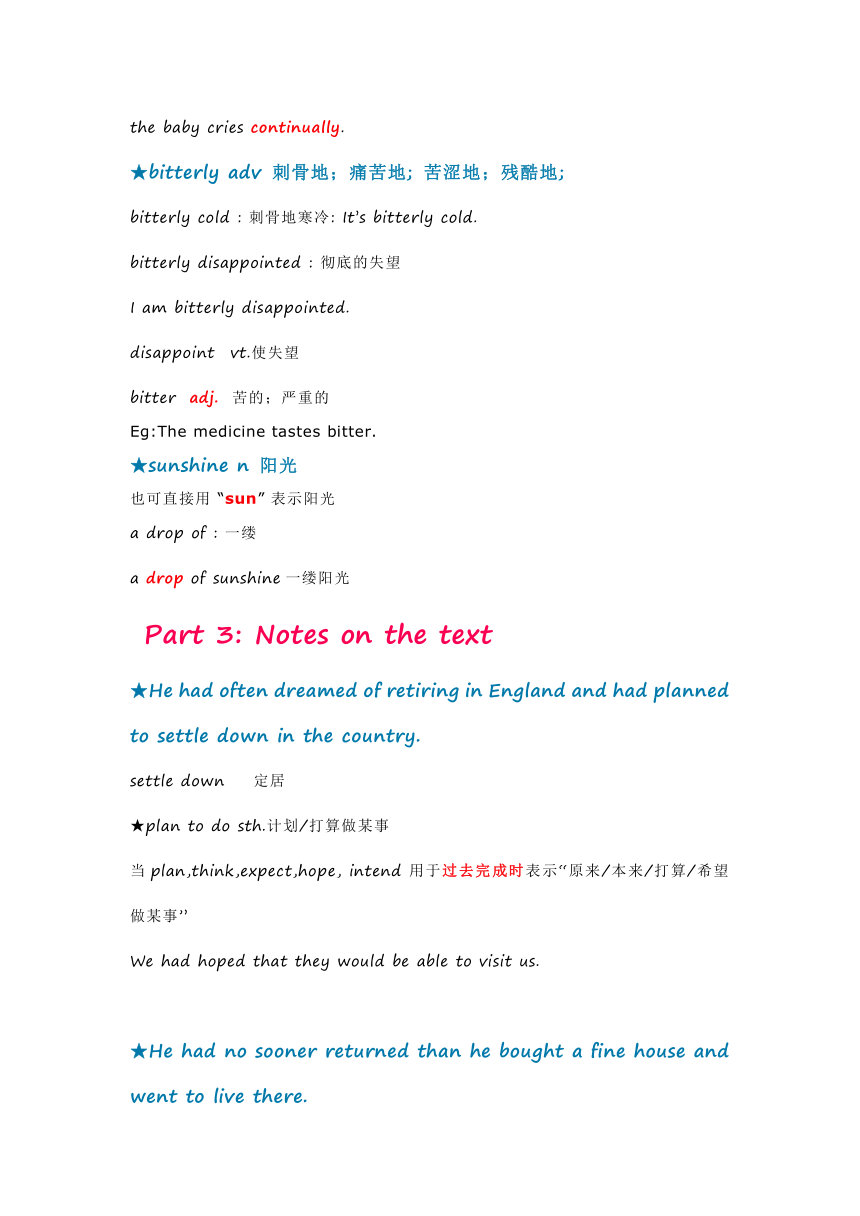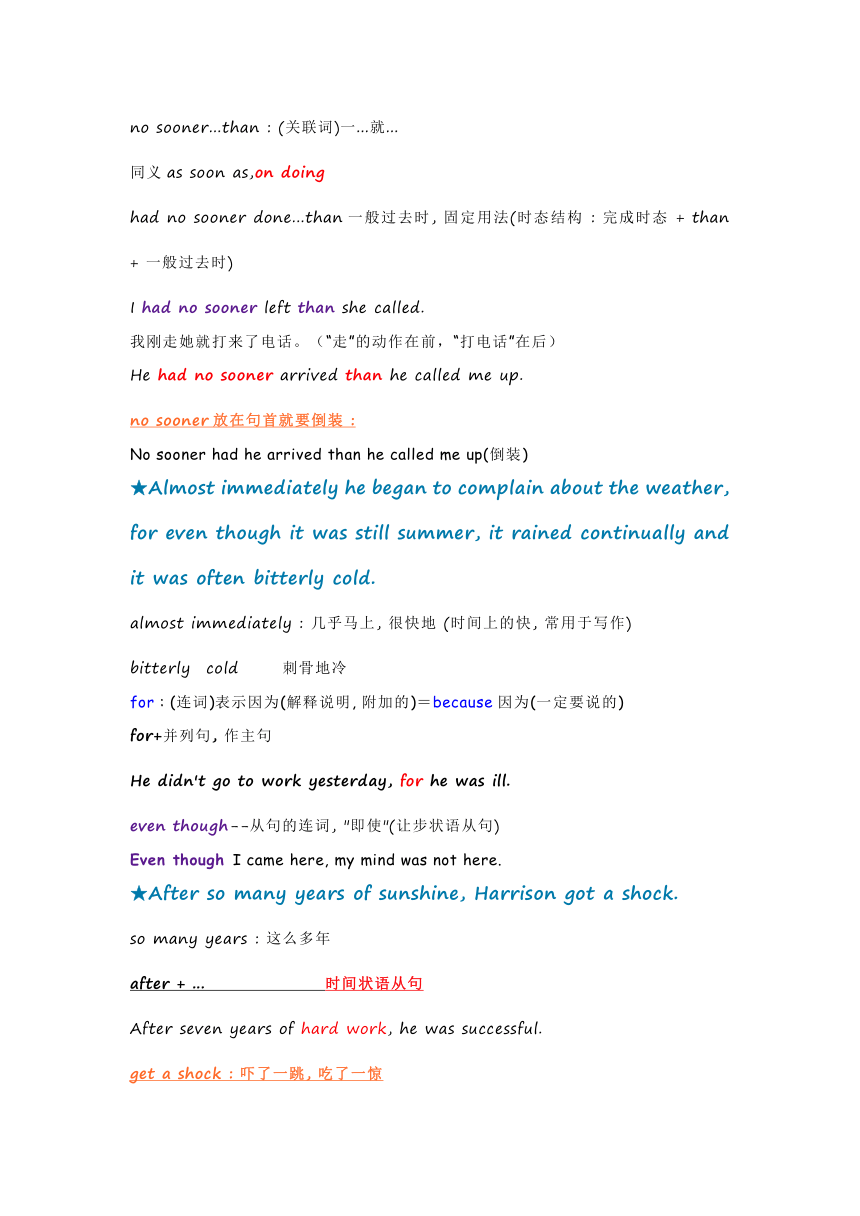新概念英语第二册 Lesson 38 Across the Channel 讲义
文档属性
| 名称 | 新概念英语第二册 Lesson 38 Across the Channel 讲义 |  | |
| 格式 | docx | ||
| 文件大小 | 24.5KB | ||
| 资源类型 | 教案 | ||
| 版本资源 | 新概念英语 | ||
| 科目 | 英语 | ||
| 更新时间 | 2023-09-24 22:30:16 | ||
图片预览




文档简介
lesson 38 Across the Channel
Part 1: Text
My old friend, Harrison, had lived in the Mediterranean [medit 'reini n] for many years before he returned to England. He had often dreamed of retiring in England and had planned to settle down in the country. He had no sooner returned than he bought a fine house and went to live there. Almost immediately he began to complain about the weather, for even though it was still summer, it rained continually and it was often bitterly cold. After so many years of sunshine, Harrison got a shock. He acted as if he had never lived in England before. In the end, it was more than he could bear. He had hardly had time to settle down when he sold the house and left the country. The dream he had had for so many years ended there. Harrison had thought of everything except the weather.
Part 2: New words and expressions
except [ik'sept] prep.除了
Mediterranean[ medit 'reini n] n.(the~)地中海
complain [k m'plein] v.抱怨
continually [k n'tinju li] ad.不断地
bitterly ['bit li] ad.刺骨地
sunshine ['s n ain] n.阳
★except [ik'sept] prep.除了
1.vt. 略去,删去;不计;把…除外,免除
When I say that the boys are lazy, I except you.
You will be punished, I can except no one.
2.prep. 除…外
I know nothing about him except that he lives next door.
except 与besides 区别:
besides 表示“除… 以外,(还,也)”,相当于in addition to.
Besides English, they also study maths and chemistry除了英语以外,他们还学习数学和化学。
注意: 不要将besides和beside混淆,beside是“在…旁边”的意思。
except 与except for区别: except for 也表示“除… 以外”,
except 连用的整体词和except 所跟的词常常是同类的,是指整体除去一部份;
except for 连用的整体词与except for 所跟的词往往不是同类的,是指整体中除去一个细节
Except for an old lady, the bus was empty.
apart from 表示“除…之外”。
根据上、下文的不同,它既可用作besides, 也可用作except 和except for。
Apart from them, I had no one to talk to. (= except)
Apart from other considerations, time is also a factor. (=besides)
(It is) Good work apart from a few slight faults. (= except for)
★Mediterranean n (the ~)地中海
Mediterranean n.地中海(=Mediterranean sea, 位于欧, 亚, 非三大洲之间), 地中海沿岸的居民
adj.地中海的, 地中海民族的
★complain v 抱怨
complain to sb : 向某人抱怨
complain of/about : 抱怨某事
★continually adv. 不断地
continue v. 继续, 连续, 延伸
continue to do继续做另一件事情(已经完成一件工作)
After he finished reading a novel,he continued to play games with his friends.
continue doing
继续做同一件事(还没完成)
After a rest,he continues his reading.
continually : 连续地, 频繁地(时断时续)
the baby cries continually.
★bitterly adv 刺骨地;痛苦地; 苦涩地;残酷地;
bitterly cold : 刺骨地寒冷: It’s bitterly cold.
bitterly disappointed : 彻底的失望
I am bitterly disappointed.
disappoint vt.使失望
bitter adj. 苦的;严重的
Eg:The medicine tastes bitter.
★sunshine n 阳光
也可直接用 “sun” 表示阳光
a drop of : 一缕
a drop of sunshine一缕阳光
Part 3: Notes on the text
★He had often dreamed of retiring in England and had planned to settle down in the country.
settle down 定居
★plan to do sth.计划/打算做某事
当plan,think,expect,hope, intend 用于过去完成时表示“原来/本来/打算/希望做某事”
We had hoped that they would be able to visit us.
★He had no sooner returned than he bought a fine house and went to live there.
no sooner...than : (关联词)一...就...
同义as soon as,on doing
had no sooner done...than一般过去时, 固定用法(时态结构 : 完成时态 + than + 一般过去时)
I had no sooner left than she called.
我刚走她就打来了电话。(“走”的动作在前,“打电话”在后)
He had no sooner arrived than he called me up.
no sooner放在句首就要倒装 :
No sooner had he arrived than he called me up(倒装)
★Almost immediately he began to complain about the weather, for even though it was still summer, it rained continually and it was often bitterly cold.
almost immediately : 几乎马上, 很快地 (时间上的快, 常用于写作)
bitterly cold 刺骨地冷
for : (连词)表示因为(解释说明, 附加的)=because因为(一定要说的)
for+并列句, 作主句
He didn't go to work yesterday, for he was ill.
even though--从句的连词, "即使"(让步状语从句)
Even though I came here, my mind was not here.
★After so many years of sunshine, Harrison got a shock.
so many years : 这么多年
after + ... 时间状语从句
After seven years of hard work, he was successful.
get a shock : 吓了一跳, 吃了一惊
★He acted as if he had never lived in England before.
as if+句子: 似乎, 好像
1.as if 从句用陈述语气的情况。= as though
当说话者认为句子所述的是真实的或极有可能发生或存在的事实时。如:
It sounds as if it is raining
2.as if 从句用虚拟语气的情况。
当说话人认为情况是不真实的或极少有可能发生或存在的情况时。从句虚拟语气动词时态的形式如下:
(1)如果从句表示与现在事实相反,谓语动词用一般过去时。如: You look as if you didn’t care.
(2)从句表示与过去事实相反,谓语动词用“had+过去分词”。如:
He talks about Rome as if he had been there before.
(3)从句表示与将来事实相反,谓语动词用“would/could/might+动词原形”。如:
It looks as if it might snow.(might 表推测)
★He had hardlyhad time to settle down when he sold the house and left the country.
hardly...when...:还没来得及...就...;
前半部分过去完成时,后半部分一般过去式。
用法同no sooner ... than
hardly had sb done (hardly在句首, 要倒装)
Hardly had I finished eating when he came in. 我刚吃完他就进来了。
“吃完饭”动作在前,“进来”动作在后。
have time to do sth : 有时间做某事
I have no time to talk with you. 我没时间和你说话
I have enough time to have coffee. 我有足够的时间喝咖啡
【Special Difficulties】难点:
★no sooner...than...一...就...
hardly...when...几乎没来得及...就...
as soon as...一...就...
三者的意思非常相近,所以有时候也可以互换.
如:我刚到教室,铃声就响了
1. I had no sooner arrived at the classroom than the bell rang
2. As soon as I arrived at the classroom, the bell rang.
3. I had hardly arrived at the classroom when the bell rang.
注意,如果no sooner/hardly 放于句首的时候,句子要主谓倒装
4. No sooner had I arrived at the classroom than the bell rang.
Hardly had I arrived at the classroom when the bell rang
Part 4: Grammar&Difficult points
1.过去完成时
过去完成时:表示过去某一时间和动作之前已经发生或完成了的动作或一直持续的动作即过去的过去。
2.过去完成时态的标志:
1.和by+过去时间点连用,如:
by the time, by then, by last year, by the end of last year/month..., by five o’clock yesterday, evening...
By the end of last term, they had learned 10 English words
2.和before+过去时间点连用
We had arrivedthe station before ten o’clock.
3.和up till/until+过去时间点连用,如:up till then, up until last night...
Li Lei had washed the dishes till then.
3.结构构成:had + V-过去分词
Part 5: Homework
1.背诵lesson 38单词&课文
2.Retell the text
3.练习总结课文
Part 1: Text
My old friend, Harrison, had lived in the Mediterranean [medit 'reini n] for many years before he returned to England. He had often dreamed of retiring in England and had planned to settle down in the country. He had no sooner returned than he bought a fine house and went to live there. Almost immediately he began to complain about the weather, for even though it was still summer, it rained continually and it was often bitterly cold. After so many years of sunshine, Harrison got a shock. He acted as if he had never lived in England before. In the end, it was more than he could bear. He had hardly had time to settle down when he sold the house and left the country. The dream he had had for so many years ended there. Harrison had thought of everything except the weather.
Part 2: New words and expressions
except [ik'sept] prep.除了
Mediterranean[ medit 'reini n] n.(the~)地中海
complain [k m'plein] v.抱怨
continually [k n'tinju li] ad.不断地
bitterly ['bit li] ad.刺骨地
sunshine ['s n ain] n.阳
★except [ik'sept] prep.除了
1.vt. 略去,删去;不计;把…除外,免除
When I say that the boys are lazy, I except you.
You will be punished, I can except no one.
2.prep. 除…外
I know nothing about him except that he lives next door.
except 与besides 区别:
besides 表示“除… 以外,(还,也)”,相当于in addition to.
Besides English, they also study maths and chemistry除了英语以外,他们还学习数学和化学。
注意: 不要将besides和beside混淆,beside是“在…旁边”的意思。
except 与except for区别: except for 也表示“除… 以外”,
except 连用的整体词和except 所跟的词常常是同类的,是指整体除去一部份;
except for 连用的整体词与except for 所跟的词往往不是同类的,是指整体中除去一个细节
Except for an old lady, the bus was empty.
apart from 表示“除…之外”。
根据上、下文的不同,它既可用作besides, 也可用作except 和except for。
Apart from them, I had no one to talk to. (= except)
Apart from other considerations, time is also a factor. (=besides)
(It is) Good work apart from a few slight faults. (= except for)
★Mediterranean n (the ~)地中海
Mediterranean n.地中海(=Mediterranean sea, 位于欧, 亚, 非三大洲之间), 地中海沿岸的居民
adj.地中海的, 地中海民族的
★complain v 抱怨
complain to sb : 向某人抱怨
complain of/about : 抱怨某事
★continually adv. 不断地
continue v. 继续, 连续, 延伸
continue to do继续做另一件事情(已经完成一件工作)
After he finished reading a novel,he continued to play games with his friends.
continue doing
继续做同一件事(还没完成)
After a rest,he continues his reading.
continually : 连续地, 频繁地(时断时续)
the baby cries continually.
★bitterly adv 刺骨地;痛苦地; 苦涩地;残酷地;
bitterly cold : 刺骨地寒冷: It’s bitterly cold.
bitterly disappointed : 彻底的失望
I am bitterly disappointed.
disappoint vt.使失望
bitter adj. 苦的;严重的
Eg:The medicine tastes bitter.
★sunshine n 阳光
也可直接用 “sun” 表示阳光
a drop of : 一缕
a drop of sunshine一缕阳光
Part 3: Notes on the text
★He had often dreamed of retiring in England and had planned to settle down in the country.
settle down 定居
★plan to do sth.计划/打算做某事
当plan,think,expect,hope, intend 用于过去完成时表示“原来/本来/打算/希望做某事”
We had hoped that they would be able to visit us.
★He had no sooner returned than he bought a fine house and went to live there.
no sooner...than : (关联词)一...就...
同义as soon as,on doing
had no sooner done...than一般过去时, 固定用法(时态结构 : 完成时态 + than + 一般过去时)
I had no sooner left than she called.
我刚走她就打来了电话。(“走”的动作在前,“打电话”在后)
He had no sooner arrived than he called me up.
no sooner放在句首就要倒装 :
No sooner had he arrived than he called me up(倒装)
★Almost immediately he began to complain about the weather, for even though it was still summer, it rained continually and it was often bitterly cold.
almost immediately : 几乎马上, 很快地 (时间上的快, 常用于写作)
bitterly cold 刺骨地冷
for : (连词)表示因为(解释说明, 附加的)=because因为(一定要说的)
for+并列句, 作主句
He didn't go to work yesterday, for he was ill.
even though--从句的连词, "即使"(让步状语从句)
Even though I came here, my mind was not here.
★After so many years of sunshine, Harrison got a shock.
so many years : 这么多年
after + ... 时间状语从句
After seven years of hard work, he was successful.
get a shock : 吓了一跳, 吃了一惊
★He acted as if he had never lived in England before.
as if+句子: 似乎, 好像
1.as if 从句用陈述语气的情况。= as though
当说话者认为句子所述的是真实的或极有可能发生或存在的事实时。如:
It sounds as if it is raining
2.as if 从句用虚拟语气的情况。
当说话人认为情况是不真实的或极少有可能发生或存在的情况时。从句虚拟语气动词时态的形式如下:
(1)如果从句表示与现在事实相反,谓语动词用一般过去时。如: You look as if you didn’t care.
(2)从句表示与过去事实相反,谓语动词用“had+过去分词”。如:
He talks about Rome as if he had been there before.
(3)从句表示与将来事实相反,谓语动词用“would/could/might+动词原形”。如:
It looks as if it might snow.(might 表推测)
★He had hardlyhad time to settle down when he sold the house and left the country.
hardly...when...:还没来得及...就...;
前半部分过去完成时,后半部分一般过去式。
用法同no sooner ... than
hardly had sb done (hardly在句首, 要倒装)
Hardly had I finished eating when he came in. 我刚吃完他就进来了。
“吃完饭”动作在前,“进来”动作在后。
have time to do sth : 有时间做某事
I have no time to talk with you. 我没时间和你说话
I have enough time to have coffee. 我有足够的时间喝咖啡
【Special Difficulties】难点:
★no sooner...than...一...就...
hardly...when...几乎没来得及...就...
as soon as...一...就...
三者的意思非常相近,所以有时候也可以互换.
如:我刚到教室,铃声就响了
1. I had no sooner arrived at the classroom than the bell rang
2. As soon as I arrived at the classroom, the bell rang.
3. I had hardly arrived at the classroom when the bell rang.
注意,如果no sooner/hardly 放于句首的时候,句子要主谓倒装
4. No sooner had I arrived at the classroom than the bell rang.
Hardly had I arrived at the classroom when the bell rang
Part 4: Grammar&Difficult points
1.过去完成时
过去完成时:表示过去某一时间和动作之前已经发生或完成了的动作或一直持续的动作即过去的过去。
2.过去完成时态的标志:
1.和by+过去时间点连用,如:
by the time, by then, by last year, by the end of last year/month..., by five o’clock yesterday, evening...
By the end of last term, they had learned 10 English words
2.和before+过去时间点连用
We had arrivedthe station before ten o’clock.
3.和up till/until+过去时间点连用,如:up till then, up until last night...
Li Lei had washed the dishes till then.
3.结构构成:had + V-过去分词
Part 5: Homework
1.背诵lesson 38单词&课文
2.Retell the text
3.练习总结课文
同课章节目录
